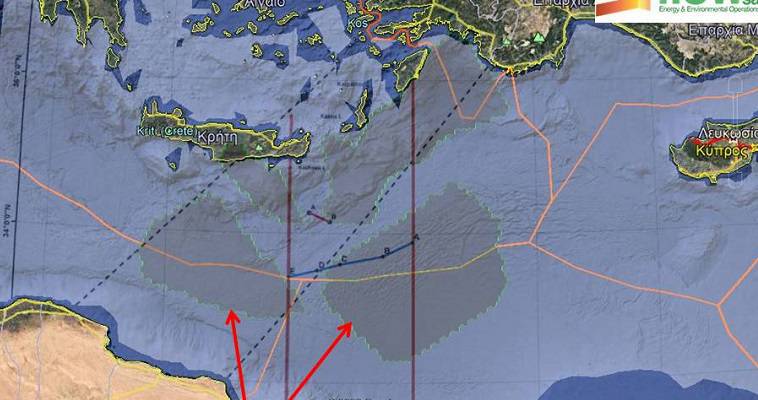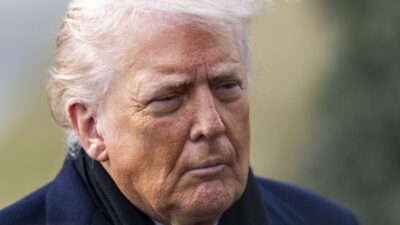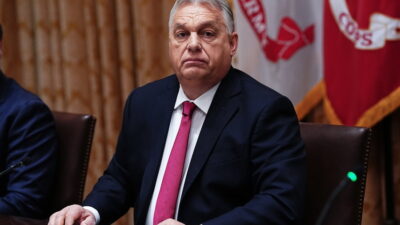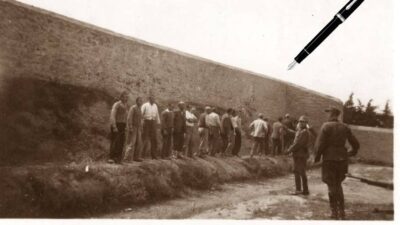Ilias Konofagos: The missed opportunity of August 2019 – The deposits in the EEZ south of Crete
08/08/2020
In August 2019, the president and CEO of EDEY (Hellenic Hydrocarbon Management Company) Giannis Basias persistently asked the competent Minister of Energy, Mr. Kostis Hatzidakis, to announce a tender for five marine plots with two possible sites south of Crete (plots 4 and 5).
The answer he received from Mr. Hatzidakis was clearly negative: He was told that there would be no new concessions. As it is known, the last concessions, which had been made until then, concerned the two contracts signed between EDEY and two of the largest oil companies in the world (ie Exxon Mobil, Total and Hellenic Petroleum, Figure 1).
The position of the competent minister was then that the concessions that had been made in Greece would be the last and there should be no follow-up. This sad event was enough to block the unique opportunity that Greece had at the time to secure mining rights, through bilateral agreements south of Crete, before the Ankara-Tripoli memorandum was signed (November 2019). Thus, the opportunity to build a bulwark was lost, given that the contracts for exploration and exploitation of hydrocarbons between Greece and large oil companies are of a total duration of 43 years.
As is well known, under current hydrocarbon legislation, mining concession contracts provide for a period of eight years for exploration, 25 years for exploitation and 10 years for extension of exploitation, for a total of 43 years. It is obvious that such contracts would be a serious geopolitical and legal bulwark, since they would have preceded in time.
Unjustified refusal
The unjustified refusal of Mr. Hatzidakis deprived Greece of this bulwark. We will not claim that if these agreements had been signed, Erdogan would not have made his move. We argue, however, that Greece would be in a better position than it was in November 2019. Because then Crete was “naked” in the face of the legal, economic and geostrategic invasion of the Erdogan-Sarraj duo. (Figure 2).
The partial EEZ delimitation agreement between Egypt and Greece (Figure 3) unfortunately came too late and under the unbearable pressure exerted by the Ankara-Tripoli memorandum in Greece. The only thing that partial demarcation offers is a legal weapon. The Greece-Egypt agreement, now, stands as bulwark against cutting across the outside-international-law Ankara-Tripoli memorandum.
That it “cuts across”, however, is relative, and to be precise it is limited to the legal level. In other words, it is not going to stop Erdogan from implementing the memorandum he signed with Sarraj. The Turkish president, in fact, hastened to clarify it immediately with a statement. It is most likely, therefore, that it will accelerate the Turkish research and drilling just off the Greek territorial waters in the arc of Kastellorizo-Rhodes-Karpathos-Kasos-Crete.
The Cairo agreement also came at a cost
This does not mean, of course, that the EEZ delimitation agreement with Egypt was wrongly sought. We are just mentioning this so as not to cultivate unfounded expectations from the signing of the Greek-Egyptian agreement. In addition, the cost paid by Greece to enable the signing of this agreement must be mentioned.
We are talking about the political implication of the exemption from the delimitation of the sea area east of the 28th meridian. The agreement excluded not only Kastellorizo, but also eastern Rhodes and the influence of Karpathos, Kassos and Crete to the east. To this we must add the negative precedent created by the recognition of reduced influence (44% instead of 50%) mainly of Crete and a bit of that of Kassos.
The Greek-Egyptian agreement made us wonder if and to what extent the Ministries of Energy and Foreign Affairs are in consultation and coordination on a vital issue of national importance. In the summer of 2019, the Minister of Energy kicked away the possibility of creating – with future economic benefit and no cost – a legal, but also political bulwark against Turkish expansionist aspirations.
Almost a year later, the Foreign Minister signed the Greek-Egyptian agreement, paying a heavy national price, in order to create a counterweight to the memorandum signed in the meantime by Ankara and Tripoli. How is this possible? Either the energy minister committed a “crime” by omission in August 2019, or the foreign minister paid dearly for the agreement with Cairo in August 2020.
Let us now turn to another aspect. Does the negotiation for the partial demarcation of the EEZ between Greece and Egypt have anything to do with the possible existence and the possible size of hydrocarbon deposits in the specific area? In Figure 3 we placed a recent satellite imagery of hydrocarbon concentration sites south and southeast of Crete, as carried out by FLOW Energy, in collaboration with the Kiev Academy of Sciences (Electromagnetic Remote Sensing Localization of Hydrocarbons).
The Egyptian side, based on its vast experience in the region, negotiated knowing very well the position and statistical value of the expected mineral wealth east and southeast of Crete. The question is whether the same applies to the Greek side? The answer is no, judging by the fact that Greece granted additional EEZ to Egypt in an area that according to research is considered to host a large deposit (figure 3).
Utilized deposits
Greece remains a prisoner of hydrocarbon imports. The lack of expression of a specific political-strategic promotion of our potential domestic mineral wealth in a horizon of 30 years (in combination with the coronavirus pandemic and the economic crisis), does not seem to foreshadow a pleasant future for Greece.
Both the Prime Minister and the competent Minister of Energy do not dare to express based on the records of EDEY SA to date (or the presence in Greece of the major international oil companies ExxonMobil and Total) that there is indeed a reasonable chance of having a 30 year horizon of hydrocarbon deposits.
They also do not dare say that Greece will do everything possible in the next 30 years to replace part of its oil and gas imports with its own hydrocarbon production. The feeling that the Greek thinking citizen has today is that Greece pays dearly for the imports of hydrocarbons, of course for the benefit of importers. In the end, it seems that the only country that is really interested and passionate about the plunder of Greek mineral wealth, is Turkey.
Despite all the above, we remain optimistic, based on the opinion that “if you want to know the future of your country, you must know its wealth”. Here we may add “if it is possible to know exactly where it is”! We want to believe that in the end the obvious national interest will eventually overcome both private interests and ideologies. So let’s hope that as soon as the coronavirus goes away, all of the above will be just a bad memory …








